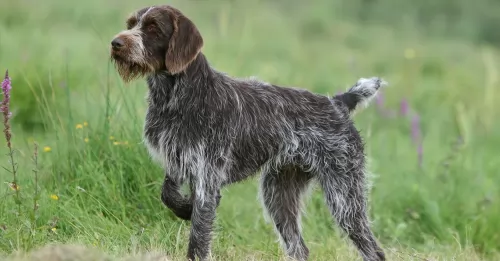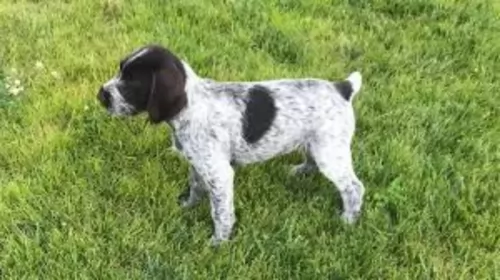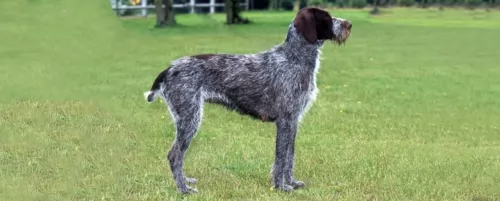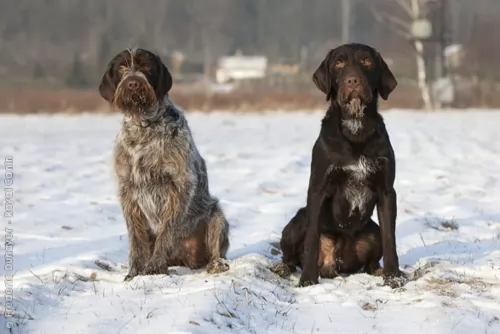 Petzlover
Petzlover Cesky Fousek is originated from Czech Republic but Maltese is originated from Italy. Cesky Fousek may grow 41 cm / 17 inches higher than Maltese. Cesky Fousek may weigh 23 kg / 51 pounds more than Maltese. Both Cesky Fousek and Maltese has same life span. Cesky Fousek may have more litter size than Maltese. Cesky Fousek requires Low Maintenance. But Maltese requires Moderate Maintenance
Cesky Fousek is originated from Czech Republic but Maltese is originated from Italy. Cesky Fousek may grow 41 cm / 17 inches higher than Maltese. Cesky Fousek may weigh 23 kg / 51 pounds more than Maltese. Both Cesky Fousek and Maltese has same life span. Cesky Fousek may have more litter size than Maltese. Cesky Fousek requires Low Maintenance. But Maltese requires Moderate Maintenance
 The Cesky Fousek is also known as the Bohemian Wire-Haired Pointing Griffon and he hails from the Czech Republic. The name ‘Fousek’ is referring to the dogs facial hair.
The Cesky Fousek is also known as the Bohemian Wire-Haired Pointing Griffon and he hails from the Czech Republic. The name ‘Fousek’ is referring to the dogs facial hair.
With World War 1, the dog all but disappeared, but with careful breeding, its numbers have built up. Today the dog is a popular hunting breed in its home country. In 1957 and 1958, Czechoslovakia joined the Federation Cynologique Internationale, and this is when a new breed standard was written and approved. In 1964, the dog breed was recognized by the FCI and by the United Kennel Club in 1996.
The Cesky Fousek has even been represented on postage stamps issued in the country in 1965, and again in 1973. Today, the breed is as popular as ever in the Czech Republic as well as other countries where there are breeding programs.
 The Maltese dog hardly needs any introduction as this is an ancient breed which is still as popular as ever. Some people refer to it as the "Maltese Lion Dog," or "Melita" which was Malta’s previous name.
The Maltese dog hardly needs any introduction as this is an ancient breed which is still as popular as ever. Some people refer to it as the "Maltese Lion Dog," or "Melita" which was Malta’s previous name.
It was in the 19th century, that the Kennel Club settled on the name of Maltese for the dog breed. The dog has been selectively bred to keep its small size. The exact origin of the dog is unknown and there are various stories surrounding where its origins are, thought to be Italy.
It is believed that dogs such as spaniels and poodles have been used to bring about the Maltese. The American Kennel Club, a registry for pure bred dogs, recognized the breed in 1888.
 The Cesky Fousek is a medium sized dog with both the male and the female standing between 58 – 66cm and weighing 22–28kg. The dog has a fairly distinctive appearance, looking quite a bit like a German Wire-haired Pointer, but he has the mustache and beard which the Pointer doesn’t have.
The Cesky Fousek is a medium sized dog with both the male and the female standing between 58 – 66cm and weighing 22–28kg. The dog has a fairly distinctive appearance, looking quite a bit like a German Wire-haired Pointer, but he has the mustache and beard which the Pointer doesn’t have.
The tail of this dog is carried horizontally and is generally docked to 3/5 of its natural length to give the dog a distinctive look. These days, with regulations around docking, the tail is left long. The ears are floppy and rounded at the tips and the eyes are brown.
The dog’s coat is short to medium length and fairly coarse with colors being dark roan or brown with ticked markings.
The Cesky Fousek is an energetic, eager-to-please dog and he just loves playing with the children in the home. He is an intelligent dog who is loyal, social and protective and you’ll find that he is easy to train. In fact, with socialization and training, he becomes obedient and amicable around adults, children and other pets.
 The Maltese is looked upon as a toy dog. Both male and female stand roughly between 20-25cm in height and weigh between 1 and 4kg.
The Maltese is looked upon as a toy dog. Both male and female stand roughly between 20-25cm in height and weigh between 1 and 4kg.
He is as cute as a button with a rounded skull, a pitch black nose, brown eyes and medium length floppy ears. The tail is feathery and is curled. He has a long, silky coat without an undercoat.
The color of his coat is pure white, and because he doesn’t shed he is looked upon as being hypoallergenic. Most people who own a Maltese like having the coat short to one length all round.
These little dogs have been bred to be companion dogs. They may be little, but it is a good idea to have him trained and socialized as they are inclined to be a bit snappy, especially with children.
He is intelligent, so training him won’t be difficult. Brought up the right way though, he can be good with children as well as pets in the home. They love their human families and want to be constantly with them. He is an energetic little dog too, and will just love ball games both inside and outside.
His very temperament and smallness make it that he fits perfectly into life in the city or the countryside. He is sweet and gentle but he makes a good watchdog, alerting you with his barking to strangers coming close by. Don’t leave him for long period of time as he hates being on his own and then he may start barking from sheer boredom and frustration.
 The Cesky Fousek is a fun loving, good natured dog who is always up for a game. This is why he isn’t a dog that will fit into an apartment or shoe-box size garden.
The Cesky Fousek is a fun loving, good natured dog who is always up for a game. This is why he isn’t a dog that will fit into an apartment or shoe-box size garden.
Socialize and train him and he becomes a wonderful family pet, good around children and other pets. He loves human companionship and isn’t a dog to be left outside to run around on his own.
The Cesky Fousek is easy to train, and when he is treated properly and made to feel an important member of the family, he provides you with his unconditional love and friendship.
 The Maltese is a popular dog no doubt, and his smallness is a draw-card as he adapts easily to life in the city or the countryside.
The Maltese is a popular dog no doubt, and his smallness is a draw-card as he adapts easily to life in the city or the countryside.
He is loving, loyal, intelligent and responsive, making him a good family dog and being an excellent playmate for children. Teach your children how to respect animals because raucous, disrespectful kids might produce a nip from an agitated Maltese.
Being a light shedder is another draw-card, with him being looked upon as a hypoallergenic breed. He has got so many good things going for him that he is guaranteed to make you an ideal pet.
 The average lifespan of this dog breed is about 12 to 15 years, and even though he is a robust breed, some common health issues do exist.
The average lifespan of this dog breed is about 12 to 15 years, and even though he is a robust breed, some common health issues do exist.
Certainly if you’re considering breeding for your Cesky Fousek, you’ll want to have him tested for dysplasia, eye problems and Von Willebrands Disease.
Von Willebrands Disease is an inherited bleeding disorder, caused by a deficiency in the amount of a specific protein needed to help platelets.Often the dog doesn’t show outward evidence of having the disease while other dogs might even hemorrhage from the nose or elsewhere.
 Your Maltese is a feisty little thing who, with good care, can live for a good few years – up to 15 or even longer. As with any other dog, he can become ill. One or two illnesses to look out for include -
Your Maltese is a feisty little thing who, with good care, can live for a good few years – up to 15 or even longer. As with any other dog, he can become ill. One or two illnesses to look out for include -
Sebaceous adenitis is caused by inflammation of the sebaceous glands and is an uncommon skin disease found in some breeds of dog.
There are two types - one for long coated breeds and one for short coated breeds. For long or double-coated dogs, you’ll notice a white/silvery kind of dandruff on the coat as well as hair loss. There can also be skin lesions along the back and ears. It can make your pet miserable and he will need to see a vet.
A common hormonal problem is canine hypothyroidism, brought on by inadequate levels of thyroid hormones. Symptoms include hair loss, weight gain, coldness and a weakened immune system.
 The coat of the Cesky Fousek is easy to maintain and you’ll want to brush him at least twice a week with a firm bristle brush to get through the coarse hair and rid him of loose hairs.
The coat of the Cesky Fousek is easy to maintain and you’ll want to brush him at least twice a week with a firm bristle brush to get through the coarse hair and rid him of loose hairs.
Ear infections are common in dogs, but dogs with floppy ears are more susceptible to ear infections than dogs with erect ears. The infection often starts in the external ear canal and occurs when excess bacteria grows in the ear canal and it becomes inflamed.
Always take your pet to the veterinarian at the first sign of an ear infection. You’ll notice your pet shaking his head and the ear may well be red and inflamed. Your vet will discuss the proper treatment and suggest ways to prevent recurrence. The vet may also recommend an ear cleaning solution as well.
This dog breed needs plenty of exercise and he’ll love his daily walks with you. Put him on a leash and allow him to run with you when you go cycling or jogging.
This is a very active dog used to hunting and he’ll require good quality protein. Speak to your vet about how many calories your dog will need each day, more so if you have a puppy and are unsure in terms of his growth.
He is a medium-to-large breed so you’ll want a food that caters for his size, his age and his energy. Include portions of rice, vegetable and meat into his kibble from time to time for variety, and never forget to include some raw meat into his diet.
Fresh, cool water is of critical importance and should be available night and day.
 Your Maltese is going to require quality food, water, exercise and shelter to enjoy a good life. The type of food you feed any dog has a direct impact on his health.
Your Maltese is going to require quality food, water, exercise and shelter to enjoy a good life. The type of food you feed any dog has a direct impact on his health.
You need to provide him with quality food, and if its commercially manufactured food, you need to read the labels carefully so that the food is appropriate to your Maltese. For instance, you can’t mistakenly pull a ‘large-breed’ packet of food off the shelves and expect your Maltese to be able to stomach it.
If you do buy him this kibble, make sure the ingredients are wholesome. To break the monotony of eating kibble every day, give him some boiled chicken, brown rice and some raw or cooked vegetables chopped up finely into his kibble. He will love you for this as it makes a tasty meal for him and will keep him healthy.
Try to keep his diet nice and simple to avoid digestive problems.
Make sure he has constant access to fresh, cool water.
Make sure your Maltese dog has a nice warm, dry place to sleep.
Get him to the vet if you notice that he is ill.
Brush his hair twice a week and take him to have it professionally cut if you prefer.
Clip his nails when they become too long and check around his eyes and inside his ears for any kind of infection.
These little dogs are prone to dental problems and he will need to have his teeth brushed 2 or 3 times a week.